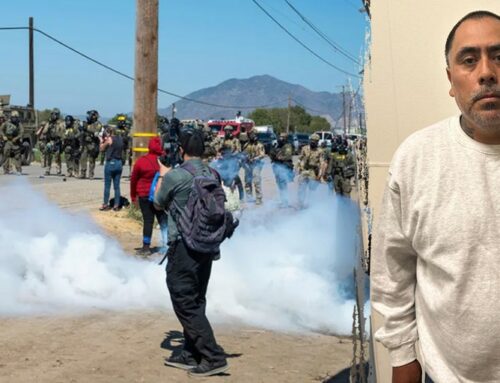Medicaid, environment experts react to Trump’s megabill, potential effects
July 13, 2025

Northwest Indiana Medicaid and environmental experts expressed concern with the impacts of the Trump Administration’s megabill.
President Donald Trump signed a megabill focused on tax breaks and spending cuts into law July 4, the day after a tight House roll call vote of 218-214 in favor of the bill.
At its core, the package’s priority is $4.5 trillion in tax breaks enacted in 2017 during Trump’s first term that would expire if Congress failed to act, along with new ones. This includes allowing workers to deduct tips and overtime pay, and a $6,000 deduction for most older adults earning less than $75,000 a year.
There’s also a hefty investment, some $350 billion, in national security and Trump’s deportation agenda and to help develop the “Golden Dome” defensive system over the U.S.
To help offset the lost tax revenue, the package includes $1.2 trillion in cutbacks to Medicaid health care and food stamps, largely by imposing new work requirements, including for some parents and older people, and a major rollback of green energy tax credits.
The nonpartisan Congressional Budget Office estimates the package will add $3.3 trillion to the deficit over the decade and 11.8 million more people will go without health coverage.
U.S. Rep. Frank Mrvan, D-Highland, issued a statement after last week’s House vote explaining his opposition vote. While the bill may seem “beautiful” to corporations and the wealthy, for a teacher in East Chicago, a nurse in Gary, the steelworker in Portage or a farmer in LaPorte County, the bill creates “uncertainty and actually increases the cost of living.”
“I opposed this measure because I cannot in good conscience leave people behind. The Republican Majority made a decision to prioritize their elite donors and corporations, and now seniors, veterans, hard-working Americans, women, children and those yet to be born will pay with increased costs and possibly their lives,” Mrvan said.
The bill passed the Senate vote two days before the House vote. The Senate’s 50-50 tie was broken by Vice President JD Vance.
U.S. Sen. Todd Young said the package includes his legislation that incentivizes R&D activity as well as leveraging private sector investment to increase affordable housing options.
“While I wish this legislation included additional fiscal reforms, this is a strong bill that will benefit Hoosier families and increase the security and prosperity of all Americans,” Young said in a statement.
U.S. Sen. Jim Banks, who voted for its passage in the Senate on Tuesday, lauded its increased funding for the Departments of Homeland Security and Defense.
“I’m proud to support the biggest tax cut for working families in American history. This bill delivers on President Trump’s promises to secure the border and strengthen our military, while also making the largest spending cut ever.”
Medicaid
Under the federal law, states have until Jan. 1, 2027, to enforce the work requirements for Medicaid enrollees. The new law means Hoosiers 19 to 64 years old will have to work at least 80 hours per month to be eligible, according to a statement from the Indiana House Democratic Caucus.
Under the law, parents of children 13 years and younger and medically frail individuals are exempt from the work requirements. But the law requires those who have to follow the work requirements to complete eligibility redeterminations twice a year, as opposed to once a year, according to the statement.
Earlier this year, the Indiana Legislature passed a law that as of July 1, imposed a work or volunteer requirement of 20 hours per week, quarterly eligibility checks and monthly monitoring of internal reviews of personal information, according to the statement.
Further, Indiana has a trigger law that requires Medicaid expansion to automatically begin unwinding if federal funding for Medicaid expansion drops below 90%, which means services would be reduced, according to the release.
Currently, Indiana’s Medicaid program is funded 90% by the federal government and 10% through the cigarette tax and hospital assessment fee, said Tracey Hutchings-Goetz, a Hoosier Action organizer.
The new federal Medicaid law will supersede the state Medicaid law, Hutchings-Goetz said.
In Indiana, Children’s Health Insurance Program, Hoosier Healthwise, Healthy Indiana Plan, Hoosier Care ConnectTraditional Medicaid, MedConnect, or Medicaid for employees with disabilities, are all funded through Medicaid, according to the release.
The bill cuts a trillion dollars from Medicaid through shifting the financial burden of Medicaid to states and taxpayers, according to the release.
“Indiana Medicaid enrollees could face cuts to services and longer waitlists due to the loss of federal funding. Even the privately insured will feel the squeeze of Medicaid cuts as hospitals and clinics will now have to eat the costs to provide uncompensated care for uninsured individuals,” according to the release.
At Hoosier Action, a community organization that focuses on issues like health care, leaders are “deeply concerned” about the megabill, and the people the organization supports are scared, Hutchings-Goetz said.
Hutchings-Goetz said that she has heard daily from Medicaid recipients who are self-employed, chronically ill, with disabilities or parents with sick children with questions about how the bill will impact them and what they can do.
In anticipation of a lapse of coverage, Hutchings-Goetz said people are considering stockpiling medications and other emergency preparedness strategies.
“People are trying to plan and they don’t have enough information, and we don’t have enough information,” Hutchings-Goetz said. “People are really scared.”
In Indiana, the Medicaid cuts will result in 12 rural hospitals closing, Hutchings-Goetz said. When that happens, people will have to travel further for care, which will lead to sicker populations and potential death, she said.
“This bill is going to make us sicker and poorer, and we’re not happy with it,” Hutchings-Goetz said.

Leslie Hawker, program manager for Everybody Counts Inc., said the new federal Medicaid law is “devastating” for everyone, as it’s projected that 17 million people will be kicked off Medicaid.
As the uninsured go to hospitals for emergency care, Hawker said insurance costs will increase for those who have private insurance as hospitals seek to recoup the cost of caring for the uninsured, Hawker said.
“It’s going to kill people, and for what? Who benefits by this bill? It’s not the normal, everyday John Q. Public. It’s people who own corporations. It’s a death sentence for a lot of people,” Hawker said.
Environment
Coupled with Medicaid changes, one former Environmental Protection Agency leader believes environmental changes will have drastic effects for U.S. citizens.
“It will increase a variety of pollution threats, like emissions from power plants, from heavy-duty diesel buses and trucks,” said former EPA Region 5 Administrator Debra Shore. “Eventually, it will lead to early deaths, loss of work and school hours. It’s a severe hit to the gains we had made in protecting public health.”
While the megabill was still going through the House and Senate, the EPA posted on Facebook, saying it “delivers for all Americans,” by eliminating hundreds of billions of dollars in Green New Deal tax credits, repealing former President Joe Biden administration’s electric vehicle mandates, and opening federal lands and waters to oil, gas, coal, geothermal and mineral leasing, according to Post-Tribune archives.
Shore, who led the EPA’s Chicago office during Biden’s presidency, said the bill is “perhaps the most sweeping rollback of environmental and public health protections in modern U.S. history.”
“The size of cuts in the EPA budget will effectively, in my opinion, eviscerate the agency,” Shore said. “At a time where Congress has been adding to the agency’s statutory mission to protect human health and the environment, it’s removing the resources that would enable it to fulfill its obligations.”
Shore is particularly worried about cuts to the agency’s Office of Research and Development budget. The budget proposes a nearly 34% decrease in science and technology funding, which is about $255 million, according to a budget breakdown.

A crew takes water samples from Lake Michigan at Portage Lakefront and Riverwalk in Portage on April 12, 2017. The U.S. Steel plant in Portage released hexavalent chromium, a carcinogen, into the Portage-Burns Waterway about 100 yards from Lake Michigan. Northwest Indiana environmentalists are concerned about what cuts to the EPA under the new federal budget bill could mean for the environment.
Specific laboratories and research areas impacted include air and energy, sustainable and healthy communities, safe and sustainable water resources, and chemical safety for sustainability. Between the four research areas, about $204.1 million from the EPA’s budget is cut in the upcoming fiscal year.
“I’ve never worked with such a team of smart, devoted professionals who had a shared sense of mission, namely to protect public health and the environment,” Shore said. “It is heartbreaking to hear how they are being treated with willful cruelty, with dismissal of expertise and utter disregard for their passionate devotion to the agency’s mission.”
Susan Thomas, director of policy and press for Just Transition Northwest Indiana, said that although the megabill’s passage was imminent, it doesn’t make it any easier.
“So much has been stripped away,” Thomas said. “It’s destruction for destruction’s sake.”
Thomas is worried about how much oil and gas companies will benefit from the megabill and how it will impact generations to come. Environmental justice communities — such as those in Northwest Indiana — could continue to suffer if industries are given more power.
She believes public health will worsen as a result of EPA rollbacks and Medicaid cuts.
An October report from Industrious Labs found that most residents in Gary are in the top 10% of U.S. residents most at-risk for developing asthma and at-risk of low life expectancy. In 2020, Indiana had a lung cancer rate of 72.5 per 100,000 people, with Lake County as one of the counties with the highest cancer mortality rates, according to the American Lung Association.
A 2016 JAMA Network report also found Gary as one of the top five U.S. cities with the lowest life expectancy at one point.
“We’ve really got to take a step in our communities and be hyperlocal,” Thomas said. “That will help make local progress, and when you make connections with folks, you make friendships, you make bonds, and you start to rely on each other. It’s really powerful.”
akukulka@post-trib.com
mwilkins@chicagotribune.com
RevContent Feed
Search
RECENT PRESS RELEASES
Related Post







